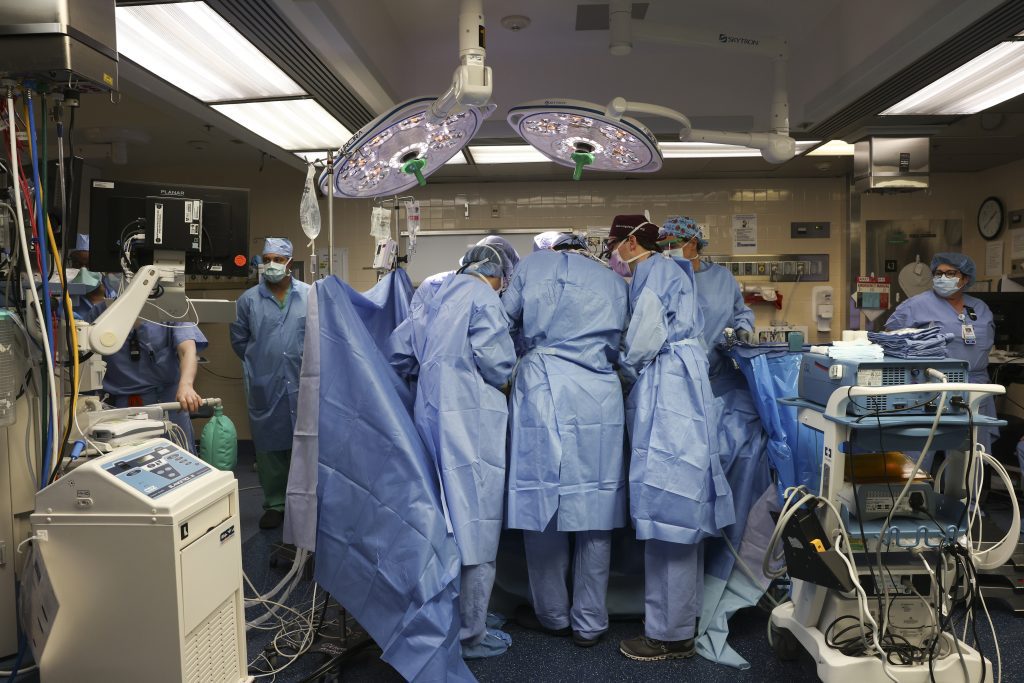Medical professionals in Boston have implanted a pig kidney into a 62-year-old patient, as part of the ongoing effort to use animal organs in humans.
Massachusetts General Hospital has reported that this is the first instance of a genetically modified pig kidney being transplanted into a living individual. In the past, pig kidneys were temporarily transplanted into brain-dead donors. Additionally, two men received pig heart transplants, but unfortunately both passed away within months.
The patient, Richard “Rick” Slayman of Weymouth, Massachusetts, is in good recovery following the surgery last Saturday, and doctors anticipate his discharge in the near future.
Dr. Tatsuo Kawai, the transplant surgeon, stated that the team believes the pig kidney will function for at least two years. Should it fail, Slayman may need to resume dialysis, according to kidney specialist Dr. Winfred Williams. Williams pointed out that unlike the recipients of pig hearts who were very ill, Slayman is “actually quite robust.”
Slayman received a kidney transplant at the hospital in 2018, but had to go back on dialysis last year when it showed signs of failure. When dialysis complications arose requiring frequent procedures, his doctors recommended a pig kidney transplant, as stated in a release by the hospital.
Slayman, a systems manager for the Massachusetts Department of Transportation, remarked, “I saw it not only as a way to help me, but a way to provide hope for the thousands of people who need a transplant to survive.”
The transplant surgery lasted four hours, with 15 individuals in the operating room who cheered when the kidney began producing urine, according to doctors at a news conference.
Dr. Parsia Vagefi, chief of surgical transplantation at UT Southwestern Medical Center, described the news as “a significant advancement.” However, echoing the Boston doctors, he mentioned that further studies involving more patients at different medical centers would be necessary for widespread implementation.
This experiment represents the most recent progress in xenotransplantation, the term for endeavors to treat human patients with cells, tissues, or organs from animals. Such efforts have historically been unsuccessful, as the human immune system promptly rejected foreign animal tissue. However, more recent attempts have involved pigs that have been modified so their organs resemble those of humans more closely, raising hopes that they might one day help address the shortage of donated organs.
Over 100,000 individuals are on the national transplant waiting list, with the majority being kidney patients, and thousands die each year before their turn arrives.
Pigs have been utilized in human medicine for some time, including pig skin grafts and the implantation of pig heart valves. However, transplanting entire organs is a far more intricate process than using highly processed tissue. The kidney implanted in Slayman was supplied by eGenesis of Cambridge, Massachusetts. The pig underwent genetic editing to eliminate harmful pig genes and incorporate certain human genes to enhance its compatibility with humans.
Slayman’s case posed challenges, as mentioned by doctors. Even prior to his initial transplant, he experienced difficulties with dialysis and required numerous procedures to address clots and restore blood flow. He became “increasingly despondent and depressed over his dialysis situation. At one point … he literally said ‘I just can’t go on like this,’” stated his kidney doctor, Williams.
The Food and Drug Administration granted special approval for Slayman’s transplant using the "compassionate use" regulations.





